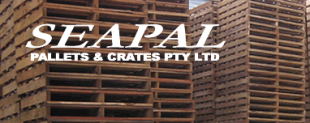Fresh take on safety leads to real results

Seapal Pallets are a timber industry manufacturer located in a remote location near Kilcoy. They are a family-owned small business with about 20 staff.
In July 2010, Workplace Health and Safety Queensland (WHSQ) and WorkCover Queensland introduced the Injury Prevention and Management program (IPaM) designed to help businesses develop better workplace health, safety and injury management systems.
Seapal Pallets and Crates began participating in the IPaM program in January 2013 with a focus on improving their workplace health and safety systems.
What was the problem?
When Seapal Pallets and Crates were invited to participate in the IPaM program, they had several claims, which led to their premium sitting at twice the industry average. The employer through a reduction in statutory claims is now positioned around the industry rate.
In addition to the claims that Seapal Pallets and Crates were experiencing, they also had several barriers to overcome in improving their workplace safety record. Their limited access to medical providers meant that it was difficult to build an appropriate injury management system.
What was the solution?
Seapal Pallets and Crates have put in place several new initiatives focusing on health and safety and better injury prevention and management. Seapal realised that they needed to change the behaviour of workers throughout the organisation so that injury prevention was central in decision making. They realised the only way this was going to be achieved was through management leading the way by formalising training requirements, and introducing initiatives to empower workers in the injury prevention process.
Other significant improvements included:
- the development of a new performance appraisal procedure that now assesses safety procedure compliance
- a new 'Employee of the Month' award that takes into account safety compliance and behaviour
- embedding health and safety into existing systems of work. For example, hazards and body discomfort are now being recorded on worker timecards
- the development of a hazard/issue box for workers to escalate concerns to management
- safety becoming an agenda item at all meetings across the company, including the weekly coordinator and maintenance meetings and monthly toolbox talks
- incident and injury data being recorded and analysed electronically
- the requirement for workers to undertake and report on a daily hazard inspection of their work area
- the engagement of a physiotherapist to attend the workplace every week. The physiotherapist is informed of any body discomfort issues reported by workers on their timecards and addresses these individually. The physiotherapist, with the support of the occupational therapist, undertakes work area assessment as needed
- the completion of a training needs assessment for all staff to ensure all appropriate training has been provided to establish a log of qualifications and licences.
Real results
WorkCover Queensland Customer Advisor Tim Barnes said, “Over the past 12 months, Seapal Pallets and Crates has been successful in implementing many advantageous strategies to improve their workplace health, safety and injury management systems.
“They are seeing real results and are currently tracking at around the industry rate through a reduction in statutory claims.”
What were the tangible benefits?
The employer has not had any claims so far in this financial year. The physiotherapist engaged by the employer has been able to address issues expressed by workers early on which has allowed workers to stay at work.
More information
This case study highlights some cost-effective and achievable steps employers can implement to improve injury management outcomes.
For more information about injury prevention and management, and resources to improve your business' injury prevention and management systems:
- call the WHS Infoline on 1300 369 915
- call WorkCover Queensland on 1300 362 128
- visit the IPaM web pages.